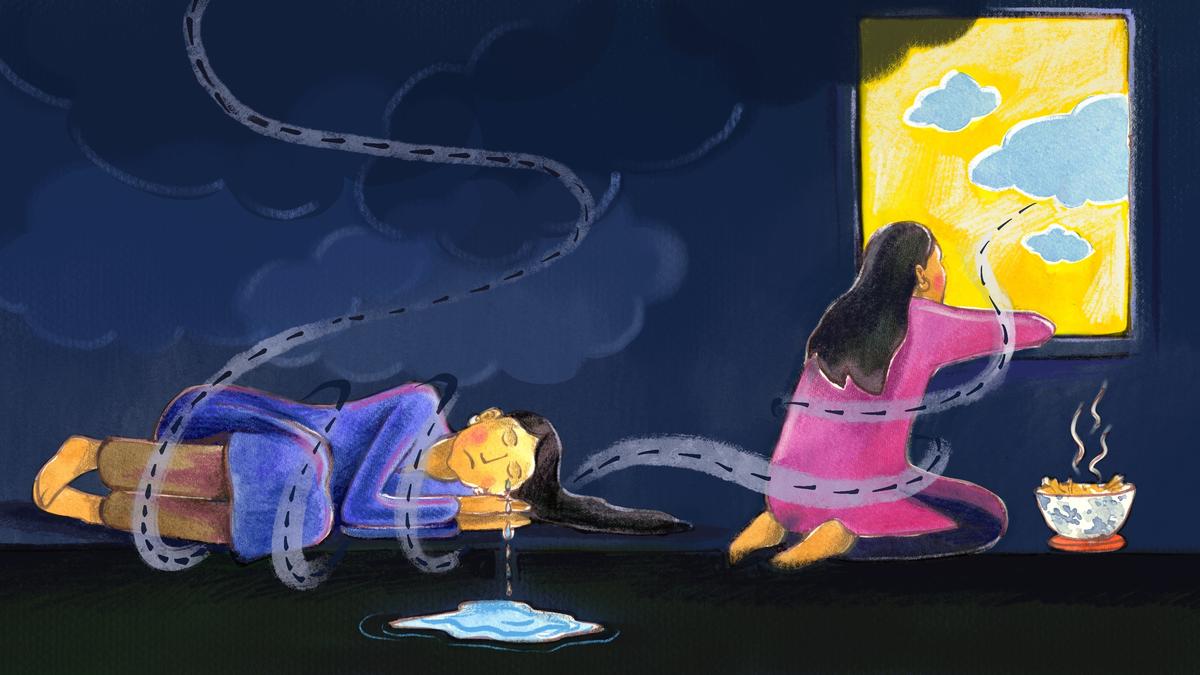
‘If you can give grief the attention it needs, it will start going about its own business soon’
| Photo Credit: Illustration: Zainab Tambawalla
I had never really known grief, not the real kind anyway. I had known heartbreaks and disappointments, but most of my life I had somehow managed to stay away from grief. I can tell you one thing about it though, even if it arrives by simply ringing the doorbell in a polite manner, by the time it leaves, it will have done its best to raze the house to the ground.
On a cold January morning, nearly a decade ago, grief arrived and pitched its camp in my home. My maternal grandfather passed away early in the morning. He was in his late 80s and had, over the last years of his life, become unwell. His passing wasn’t wholly unexpected and yet it felt like it was. It is difficult to explain how I felt but it was like after deciding to rise that morning, the sun had thought that this world really didn’t deserve it anymore, and at around 10.30 a.m. it had dived back into bed, plunging the world in complete darkness.
I don’t have many clear memories of the aftermath; mostly I remember sleeping. I would wake up from time to time to eat something and then I would sleep again. The minute I would be awake, the fact that he was gone would hit me and I would feel like I was falling through a dark tunnel. Sometimes I would think that it would be a relief if at the end of this fall, I too could just die and I waited for that to happen. But it didn’t. It frightened and angered me that I could carry so much grief and pain, and yet my organs still had the audacity to keep doing what they were supposed to.

I spent weeks falling through this dark tunnel, hoping and wishing for an end, but it never came. Instead, one day the doorbell rang and though I tried to ignore it, it rang incessantly until I opened the door and in walked Phuphee.
She said she had come because she had missed talking to me after I had refused to speak to her on the phone. I understood that the rest of the family must have told her. After settling herself in, she came into my room with a bowl of paachi ras (soupy stew made from lamb trotters) and asked how I was doing. I tried to lie as much as I could, but then I remembered how futile it was to lie to this woman and stopped talking. She brought a spoonful of the steaming soup up to my lips and said ‘drink’. I did as she asked and before I knew it, the bowl had disappeared.
I cried as I drank, the salt of the tears mixing with the salty goodness of the soup. When I had finished, she wiped my face with the sleeves of her pheran and held me as I cried. I told her how I felt and how nobody could understand how much pain I was in, and that was when she told me about Parveen. I hadn’t known of her existence before that day.
Before Phuphee had had her other children, she had a daughter named Parveen. She was three years old when one day she became unwell. She was running a high fever and had a terrible cough but by the time the doctors had picked up on how serious her infection was, it was too late. Phuphee was told to take her home and make her as comfortable as possible.
‘I held my beautiful little girl for four days and then she left,’ Phuphee said, her voice almost a whisper, ‘and I stopped being a person after that. Months went by but I had stopped moving and then one day Aapa [her maternal grandmother] arrived, and held me exactly the way I had held my beautiful Parveen just before she left and said, ‘You cannot ignore your grief, Taahira. It will wait for as long as it needs to — to be acknowledged. If you can give it the attention it needs, it will start going about its own business soon. But if you ignore it, it will fight with you needlessly like a neglected child. You have to lean into your grief Taahira, do you understand?’’

‘I didn’t really understand, but I knew Aapa would guide me. She would sit with me and we would talk about Parveen. At first it made me howl with pain, but slowly I found myself leaning into every memory I had of her. In my mind, I thought of her as a soft pillow on which I would rest my weary heart and somehow I started becoming a person again. I knew I would never be whole again and I knew I would never be the same person again, but I knew I would be a person again. And that was enough. Do you understand, myoan gaash [light of my eyes]?’
I didn’t understand but I trusted her wisdom that had come to her through many generations of women, which had led me so far. Over the next few weeks I started talking about my daddy (that’s what we called our grandfather). I would sit there and imagine leaning my head against him, and my grief would feel a tad manageable. Slowly but surely, I started becoming a person again, not the same person I was before he left or a whole person, but a person nonetheless. And I accepted that somehow that had to be enough.
Saba Mahjoor, a Kashmiri living in England, spends her scant free time contemplating life’s vagaries.
Published – June 26, 2025 04:29 pm IST
